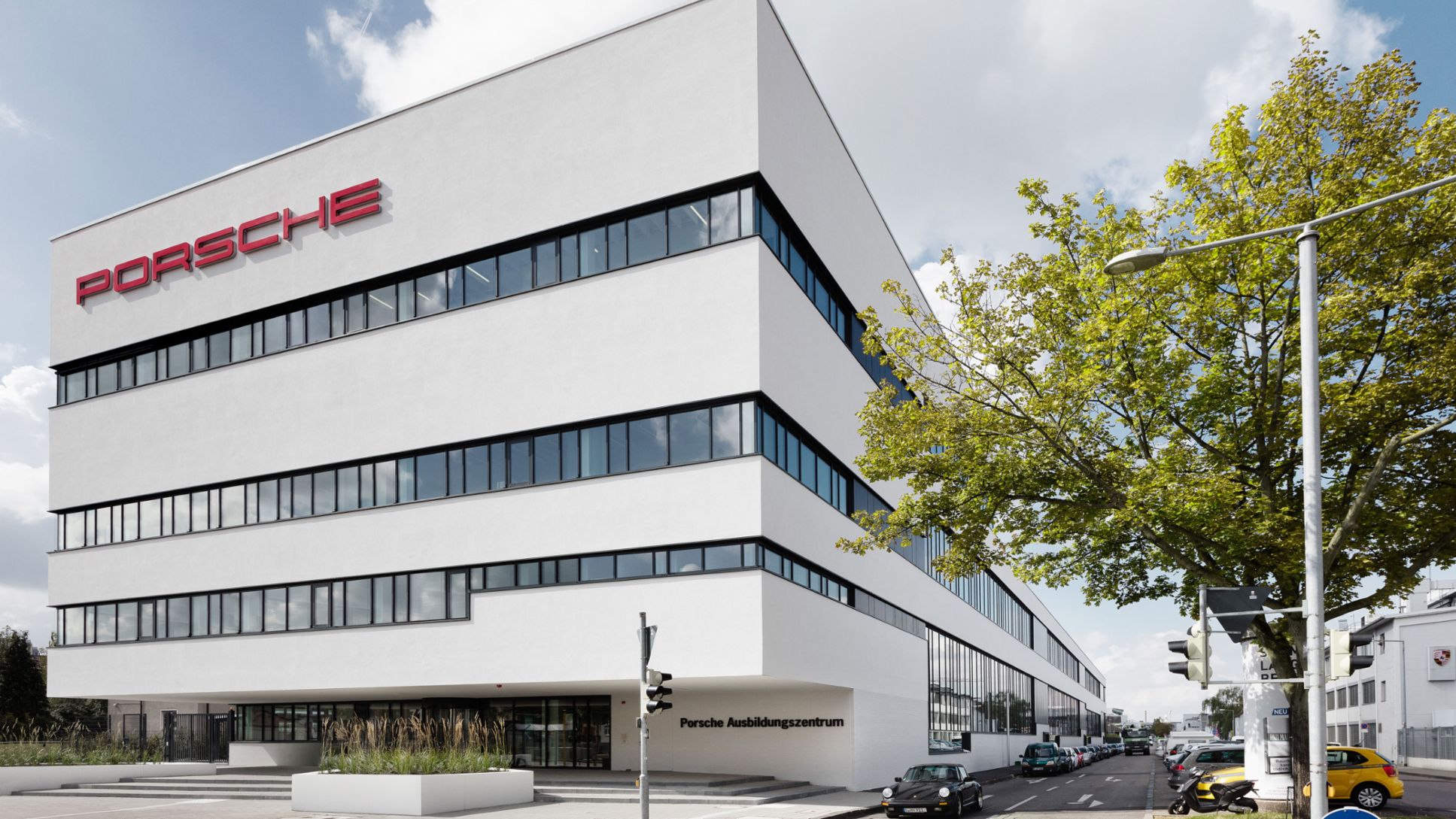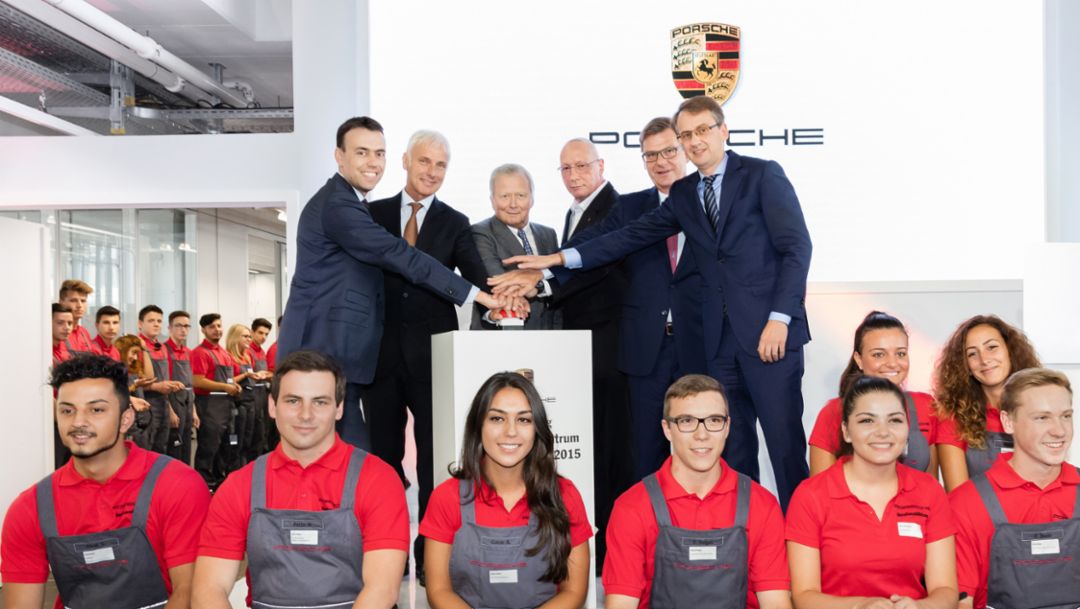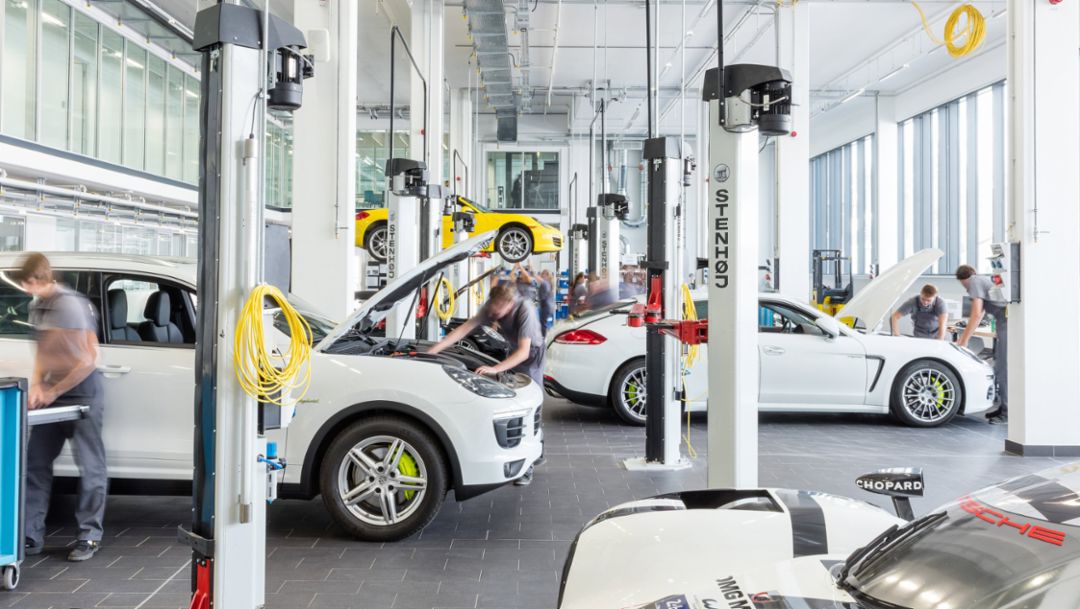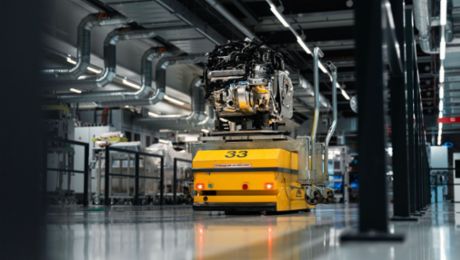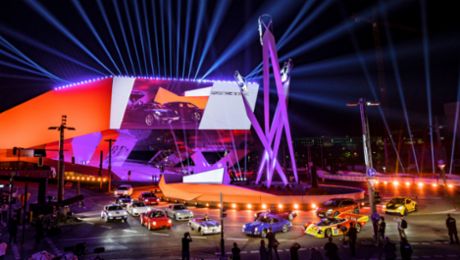On an area totalling 14,000 square metres, the new building on the site of the former tram depot in Zuffenhausen offers space for up to 500 trainees and students of the Baden-Württemberg Cooperative State University. The new training centre creates the best conditions to prepare the next generation of young professionals for the rapidly rising challenges in the automotive industry. Moreover, the sports car manufacturer makes accommodation for its growth with the new €30 million building. From 2011 to 2014, the number of career entrants at Porsche has risen by 50 per cent to 450 at present. Porsche promises all apprentices and students a permanent job guarantee upon the completion of their training.
“The construction of the training centre in Zuffenhausen is not only a clear commitment to our site in Stuttgart”, says Matthias Müller, President and CEO of Porsche AG, “with it, we have also laid the foundation for ensuring that our superior training will continue in the future. That is how perspectives open up – for the young generation and for ourselves. After all, we owe the high level of innovative strength of the Porsche brand, above all, to our outstandingly trained co-workers.”
“Professional training is a key factor for the competitiveness of the economy in Baden-Württemberg and the automotive industry. With the new training centre, Porsche has invested in an innovative professional training and in the future of young people,” says Nils Schmid, Minister of Financial and Economic Affairs in Baden-Württemberg.
Successfull training programmes
Time and again, Porsche has realised new concepts when it comes to training. The sports car manufacturer has pursued the goal, for instance, of filling 40 percent of the 106 apprenticeship spots a year in the technical-industrial area with pupils who completed lower secondary schooling. In addition, the proportion of female apprentices in technical-industrial training has increased from 5 to 27 percent in the last three years, and this figure is set to rise further. And through our preparatory year programme, every year since 2013 eleven young persons, whose training maturity would have routinely been denied, got the opportunity of an apprenticeship at Porsche. With success: 30 of the 33 young people who have passed through the nine-month programme so far are today apprentices at Zuffenhausen.
“None of this was a matter of course,” says Uwe Hück, head of the Porsche Central Works Council. “The 40 percent of pupils from lower secondary schools and the preparatory year are based on company agreements and collective agreements. It proves that co-determination is a success factor both for society as a whole and the companies. That is why we can all be proud of the culture of co-determination at Porsche. Most notably, the Porsche way shows that profit and social responsibility are not mutually exclusive concepts. Because all of this is financed by the flexibility and productivity of our colleagues – for which I would like to thank them warmly. We need to have profits in order to sustain our social commitment and take on responsibility for the future of our children.”
Looking ahead, the Chairman of the Works Council points out: “It is perfectly clear that the challenges of the labour market are getting tougher. The topics of digital technology and Industry 4.0 will have a long-term impact on the working world and change it for good. Our new training centre offers our apprentices and students the best conditions so that they can meet the challenges of the modern working world.”
Porsche offers ten different technical and commercial professional training courses. In addition, the new training centre brings together under its roof 102 students of the Baden-Württemberg Cooperative State University. They study in seven bachelor programmes to get acquainted with the working practice of a business computer scientist or electrical engineer. With the new training centre, in particular the technical-industrial apprentices will train under conditions that are unique in the industry. In addition to three learning and media rooms as well as a complete paint shop and logistics training workshops, the building, which is 150 metres long, 30 metres wide and has a height of 21.5 metres, houses an event room for up to 120 people, changing rooms and a cafeteria.
The new training centre also sets new standards in terms of energy efficiency. With the help of four renewable energy systems, the new building falls below the energy efficiency guidelines of the German federal government (Energy Saving Ordinance, EnEV) by 30% and achieves a positive ecological balance. For example, the majority of the heat and electricity is generated from a combined heat and power plant on-site. In addition, the thermal energy of the exhaust air is stored in order to heat or cool the fresh air. Geothermal energy is also used: Energy, which is stored in the earth, is conducted through 110 activated concrete pillars of the foundation and can then be used for heating or cooling. For the fourth energy source, i.e. the concrete activation, pipe systems are installed in the concrete ceilings, through which water is circulated. This system can also be deployed for cooling or heating.
With this sustainable approach, Porsche satisfies an important criterion for the selection of a desired employer, especially for the new generation of employees. Developing and advancing in the company is another vital aspect that is no less important. Under the heading of “lifelong learning”, Porsche offers a comprehensive training programme even after the apprenticeship. “Porsche is aware of its responsibility as one of the most important employers in the region, meets the growing requirements of its workforce and invests with this high-tech building systematically in the future of the up-and-coming Porsche generation. It is not for nothing that Porsche is rated one of the most attractive employers in Germany,” says Thomas Edig, Member of the Executive Board for Human Resources and Social Affairs of Porsche AG. More than 100,000 applications in 2014 and an employee turnover rate of only 0.61 percent testify to this attractiveness. The latter is also due to the in-house talent management, because no less than 86 percent of the first and second level management positions are filled with our own up-and-coming talent.
Data and facts to the new Training Centre
Construction time and costs: 2 years, €30 million
Capacity: up to 500 trainees and students of the technical-industrial and 10 commercial apprentices as well as 34 students of Baden-Württemberg Cooperative University per year
Infrastructure: includes learning and media rooms, paint shop, logistics training workshops, event room, social rooms and cafeteria, 70 parking spaces in the underground car par
Property size: 9,000 square metres
Gross flor area: 14,000 square metres
Building dimensions: 125 metres long, 30 metres wide, 21.5 metres in height
Used materials: include 11,000 cubic metres of concrete, 2,000 metric tons of steel, 1,700 square metres of glass
Energy effiency: 30 percent below the energy effiency guidelines of the German federal government (Energy Saving Ordinance, EnEV)
Four renewable energy systems:
- combinded heat and power plant for heat and electricity
- thermal energy of exhaust air used to heat or cool the fresh air
- Geotherma energy (heating and cooling) by means of circulating water in the pipe systems in the concrete ceiling
- Concrete activation (heating and cooling) by means of circulating water in the pipe systems in the concrete ceilings
